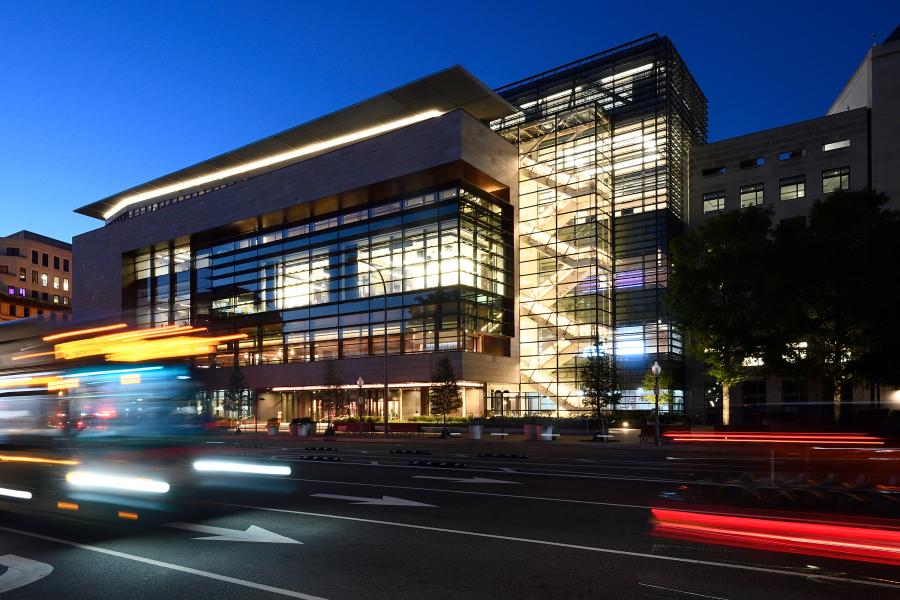- Name
- Johns Hopkins Media Relations
- jhunews@jhu.edu
- Office phone
- 443-997-9009
Johns Hopkins University, America's first research university, will launch a School of Government and Policy in its new home, the Johns Hopkins University Bloomberg Center at 555 Pennsylvania Avenue in Washington, D.C., the university announced today.
The School of Government and Policy will build on the foundation of the university's nearly 150 years of leadership in research and discovery, while drawing on existing complementary strengths in science and technology, medicine and public health, and international affairs to research and develop innovative, data-driven solutions for contemporary policy challenges and effective government.
The school will prepare the next generation of leaders and public servants to pursue evidence-based solutions to society's greatest challenges through an approach that:
- Embeds science, data, and the role and impact of technology in the curricula
- Gives students the tools they need to think strategically and creatively about policy and government innovations designed to meet the needs of the people and communities they serve
- Emphasizes the urgent need for cross-functional skills and capabilities at all levels of government and in bridging public, non-profit, and industry sectors
"Anchored in our magnificent new home in the nation's capital, the School of Government and Policy will bring novel expertise and insight informed by large-scale data sets to shape policy and address the challenges facing our nation and world," Johns Hopkins University President Ron Daniels said. "This new school will draw on our university's existing strengths in international studies, public health, medicine and life sciences, and engineering and technology and offer a different approach to the work of government and policy, one that can help rebuild confidence in our institutions and advance new and needed approaches for more effective government."
By establishing this new division, Johns Hopkins will scale its proven ability to leverage the critical insights and advances that arise from academic investigation to help governments, policymakers, and their partners in other arenas, to respond to rapidly evolving public needs and keep pace with scientific and technological change.
Johns Hopkins has a long-established presence in Washington policy circles through its celebrated School of Advanced International Studies (SAIS), leadership in biomedical research, and longstanding government partnerships, anchored by JHU's status as the federal government's largest academic research partner for 43 consecutive years and complemented by major government collaborations with the Bloomberg School of Public Health, Applied Physics Laboratory, and many other divisions of the university.
"A new School of Government and Policy at the Hopkins Bloomberg Center will unquestionably bolster the university's impact on policy change and decision-making at the federal level," said Keshia Pollack Porter, chair of the Department of Health Policy and Management at the Bloomberg School. "Our department has deep experience translating research to policy in areas such as drug pricing and access to pharmaceuticals, addiction and overdose, and gun violence. The new school will undoubtedly create opportunities for our faculty to further lean into advocating for and implementing policies that can improve the public's health and advance health equity. I am excited for opportunities for our faculty, staff, and students to partner with the new school around research, practice, and education in support of effective and impactful policy change."
JHU's legacy of public impact on evidence-based policymaking was most recently evident in its leadership of the Coronavirus Resource Center, an initiative that provided vital access to information for the public, policymakers, and journalists across the United States and around the world during the COVID-19 pandemic. Developing cross-disciplinary policy solutions to complex national and global challenges is one of the primary drivers for the creation of JHU's new school.
"The new School of Government and Policy will provide exciting opportunities for students and scholars of political science to widen their studies and deepen their impact, said Robbie Shilliam, professor and chair of the Department of Political Science at the Krieger School of Arts and Sciences. "By pooling expertise, we will be able to produce rigorous, relevant, and cutting-edge scholarship addressing the formidable challenges that face policymakers and citizenry in Baltimore, Washington, D.C, and beyond."
Added Francesco Bianchi, professor of economics: "The pandemic and recent economic and geopolitical events have shaken the foundations of our society and called into question the existing world order. Johns Hopkins has the intellectual resources and the ambition to offer solutions to these new challenges. The new School of Government and Policy represents a unique opportunity to strengthen the already prominent role that Johns Hopkins plays in shaping effective policy responses. The school will be a center of gravity for the many researchers who are passionate about policy-relevant research questions, like me and my colleagues in the economics department."
The Johns Hopkins School of Government and Policy will be based at the Hopkins Bloomberg Center, which opened this fall with a mission to connect the worlds of research and policy, educate future leaders and innovators, convene a range of viewpoints to foster discovery and dialogue, and bring a fresh infusion of artistic expression to the heart of the nation's capital. The School of Government and Policy will be co-located with SAIS at the new building, allowing the two schools to find synergies and collaborations that bring faculty expertise to transnational challenges in areas such as technology policy, climate, sustainability, economics, and finance. The school will also draw on the work of existing government-strengthening ventures at JHU such as the Bloomberg Center for Public Innovation and the Bloomberg Center for Government Excellence.
"The new School of Government and Policy will be good for Hopkins and good for the nation," said Ben Ginsberg, professor of political science and chair of the Center for Data Analytics, Policy, and Government in Washington, D.C. "Over the years, the school will bring experts in various policy domains to Hopkins and enhance our stature as a global research university. More important, the new school will allow Hopkins to influence national policy in major domestic and international realms. We can serve as a force to bring about a more just society and a better world."
A search will soon begin for a visionary leader to serve as the inaugural dean. Over the next five years, the school will hire 35 full-time faculty. A number of these faculty will hold cross-appointments to divisions across Johns Hopkins, to support opportunities for interdisciplinary collaboration and strong ties with the university's Baltimore campuses.
The new academic division is projected to serve 200-250 graduate students and offer coursework and other educational opportunities for undergraduate students. The first cohort will matriculate in the fall of 2026.
"I think this new school is a historic opportunity for the university," said Filipe Campante, a Bloomberg Distinguished Professor who specializes in political economy and vice dean for faculty affairs and research at SAIS. "I am a firm believer in the idea that where you are located has a huge influence on how you think and what you do, and the new Hopkins Bloomberg Center at 555 Penn is a unique platform for Hopkins to be at the forefront of policy discussions in what is very much the political capital of the world.
"This puts us in a perfect position to help bring science and evidence to policy, in this moment where this is most needed. As SAIS faculty myself, I can't wait for the synergies and opportunities that this new school will bring to our work."









